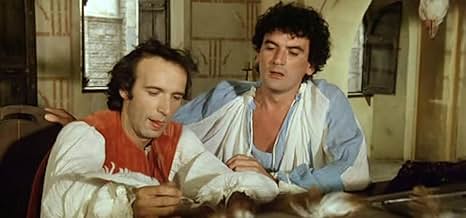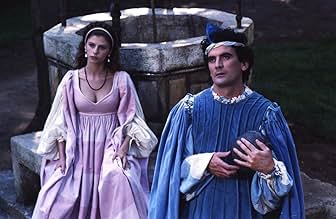Non ci resta che piangere
- 1984
- 1h 53min
CALIFICACIÓN DE IMDb
7.6/10
7.6 k
TU CALIFICACIÓN
Agrega una trama en tu idiomaIn the 80s, two friends misteriously wake up in the XV century and clumsly try to intermingle with the society of the time.In the 80s, two friends misteriously wake up in the XV century and clumsly try to intermingle with the society of the time.In the 80s, two friends misteriously wake up in the XV century and clumsly try to intermingle with the society of the time.
- Dirección
- Guionistas
- Elenco
- Premios
- 1 nominación en total
Opiniones destacadas
10pneruda
One of the best comedies ever done in the film history. Benigni and Troisi a couple that can hardly be repeated. Money doesnt necessarily make great films...and great films do not always need loads of money. This is a great example.
A real masterpiece by Benigni and Troisi. The plot is very simple and there are no special effects. However, what earns this book a place in history books is the outstanding acting performance of these two comedians. You can see from the beginning that most of the sketches are improvisations; their acting is so natural and clean. The reason why it did not gain international recognition is because it cannot possibly transmit the same emotions with with subtitles. Translation becomes nonsense in a movie that is so culturally-bound. I wish I could recommend it to everybody, but I must say that you really need to understand Italian plus some Neapolitan and Florentine dialect in order to appreciate it in its entirety. Besides, you also need to know a little bit about the culture and history of Italy. In Italy, this was, is and will always be an outstanding piece of art.
The comedy is not bad, but I wouldn't call it a good one, whatever you say. Maybe I missed something, while trying to follow the Naples and Toscany accents and reading subtitles in proper Italian (that weren't word for word translations), but it seemed really average to me.
The humor is unequal, though, some things are really funny, while most of the movie felt boring. The low budget Italian film feeling also didn't help, reminding me of those horrible "Princess dresses in boy's clothes and saves her magical cardboard kingdom" films, if you know what I mean.
The movie was recommended by an Italian friend of mine, and he is not stupid, so maybe being Italian helps a lot with this film.
The humor is unequal, though, some things are really funny, while most of the movie felt boring. The low budget Italian film feeling also didn't help, reminding me of those horrible "Princess dresses in boy's clothes and saves her magical cardboard kingdom" films, if you know what I mean.
The movie was recommended by an Italian friend of mine, and he is not stupid, so maybe being Italian helps a lot with this film.
"Non ci resta che piangere" is definitely a piece of art, directed by two of the most important Italian comedy writers: Benigni and Troisi. This is the work of a Napolitan and a Tuscan comic put together to make a film that'll make you laugh from its start and if you start, you'll never stop.
The plot is very simple: Mario and Saverio, a teacher and a janitor in an elementary school, find them in the year 1492 and it is the origin of all the funny situations you'll find in the movie.
The language used by Mario and Saverio is Italian, but Mario uses a typical Naples accent and Saverio it's using his Tuscan influence, so the language they use is crucial to the final meaning of the movie.
In the original version there was an additional scene, that the directors had to cut off when publishing the movie, despite this the movie is still very funny, and is its freshness, its lack of bad words what makes it a good comedy and a good film.
Ending, I think this movie is one of the best ever produced in Italy, but unfortunately, due to its dialectal language and the direct speech it can't be translated to other languages.
The plot is very simple: Mario and Saverio, a teacher and a janitor in an elementary school, find them in the year 1492 and it is the origin of all the funny situations you'll find in the movie.
The language used by Mario and Saverio is Italian, but Mario uses a typical Naples accent and Saverio it's using his Tuscan influence, so the language they use is crucial to the final meaning of the movie.
In the original version there was an additional scene, that the directors had to cut off when publishing the movie, despite this the movie is still very funny, and is its freshness, its lack of bad words what makes it a good comedy and a good film.
Ending, I think this movie is one of the best ever produced in Italy, but unfortunately, due to its dialectal language and the direct speech it can't be translated to other languages.
10opossumd
Totally unawares, Saverio, a teacher and Mario, a janitor of the same school in which they both work, travel back in time and find themselves in central Italy at the end of the 15th century. They carry with them an unresolved squabble concerning Saverio's sister, creating a lot of tension between the two, which will increase in the plot. From this moment on they will have to come to grips with the grotesque situation they find themselves in, trying to "hitch a lift" back to the future in a most outlandish way, using and misusing their foresight of the events taking place round that time, and generally making fools of themselves in the eyes of "normal" renaissance folks. Their meeting with Leonardo da Vinci is hysterical, when they become more and more convinced that the genius is in reality a moron. Another character they meet is Savonarola the heretic, who enjoins them to repent, before he is taken to the stake, eliciting some breezy comment from them. If it weren't for a weird kind of homesickness, they would quite enjoy living in this period, full of daring fashions and tantalising damsels.
The couple shows great chemistry and is funny in every respect. The psychology of their characters is complex and credible - for once comical roles with a depth. Basically, Saverio is an embittered petit-bourgeois forever attracted and rejected by women, envious of Mario, an easy-going proletarian every woman falls in love with. Saverio is scheming, mean and vindictive as much as Mario is naive, generous and forgiving. What a match of talents: Roberto Benigni and Massimo Troisi at the peak of combined creativity. Too bad they will never come back together for another joint venture. Or maybe it is better this way: masterpieces of this level cannot be improved on, at best they can be imitated. For this reason Non ci resta che piangere will shine like a gem in the crown of the best Italian movies of all times. Sadly not many people seem to have seen it, not even in Italy, where the viewers do not need subtitles to enjoy the hilarious juggling of the two actors with the language, but their body language can be universally appreciated.
If you miss it you will have to repent!
The couple shows great chemistry and is funny in every respect. The psychology of their characters is complex and credible - for once comical roles with a depth. Basically, Saverio is an embittered petit-bourgeois forever attracted and rejected by women, envious of Mario, an easy-going proletarian every woman falls in love with. Saverio is scheming, mean and vindictive as much as Mario is naive, generous and forgiving. What a match of talents: Roberto Benigni and Massimo Troisi at the peak of combined creativity. Too bad they will never come back together for another joint venture. Or maybe it is better this way: masterpieces of this level cannot be improved on, at best they can be imitated. For this reason Non ci resta che piangere will shine like a gem in the crown of the best Italian movies of all times. Sadly not many people seem to have seen it, not even in Italy, where the viewers do not need subtitles to enjoy the hilarious juggling of the two actors with the language, but their body language can be universally appreciated.
If you miss it you will have to repent!
¿Sabías que…?
- TriviaThe screenplay is the main guideline for the film but many dialogues were improvised by Troisi and Benigni.
- Citas
[last lines]
Saverio: Look! A train! I told you we would return to the present!
Mario: I'm not marrying Gabriellina!
Saverio: Oh yes you are!
Leonardo da Vinci: Engineers! TRAIN!
Leonardo da Vinci: For God's sake! 33%... 33%... and 33%...
[cut to a shot of the train and freeze as the film ends]
- ConexionesEdited into Bellissimo: Immagini del cinema italiano (1985)
- Bandas sonorasNel blu dipinto di blu
Written by Domenico Modugno and Franco Migliacci
Selecciones populares
Inicia sesión para calificar y agrega a la lista de videos para obtener recomendaciones personalizadas
- How long is Nothing Left to Do but Cry?Con tecnología de Alexa
Detalles
- Fecha de lanzamiento
- País de origen
- Idiomas
- También se conoce como
- Nothing Left to Do but Cry
- Locaciones de filmación
- Productoras
- Ver más créditos de la compañía en IMDbPro
Contribuir a esta página
Sugiere una edición o agrega el contenido que falta

Principales brechas de datos
By what name was Non ci resta che piangere (1984) officially released in Canada in English?
Responda























